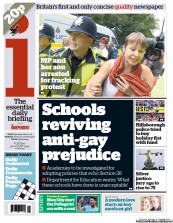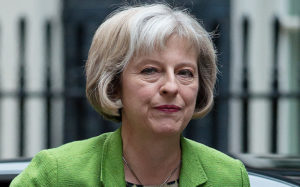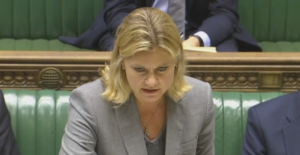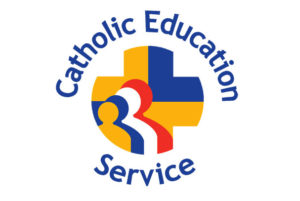“The school’s SRE policy states that it ‘cannot approve of homosexual genital acts’ and that ‘a homosexual partnership and a heterosexual marriage can never be equated’. This is the policy you will find on its website today, the policy of a state-funded school in England in 2016.”

It may have been outlawed some time ago, thrust officially into the history books by a skin-of-its-teeth vote in Parliament, but the spirit of Section 28 of the Local Government Act of 1988 – the prohibition on promoting the ‘acceptability of homosexuality as a pretended family relationship’ in schools – is still very much alive in the education system of our country. Many schools are still though to maintain such policies, often at the behest of Diocesan authorities.
The British Humanist Association exposed some such schools in a report from 2013. Reassuringly, many schools took this call to action seriously, and decided to act upon the misinformation given in these policies.
The school I left earlier this year, Bishop Challoner Catholic Secondary School in Basingstoke, has not followed the good example set by such schools. The Education for Personal Relationships Policy states that it ‘cannot approve of homosexual genital acts’, a derogatory, and frankly disgraceful term to use in describing people’s ‘personal relationships’, which does nothing to instil any confidence in pupils and parents that the Church does in fact ‘recognise the dignity of all people’ or ‘affirm the homosexual as a person’, as the same policy claims. The school then goes on to dictate its opinion on same-sex marriage, asserting incorrectly that ‘English law’ reflects the Church’s opinion that ‘a homosexual partnership and a heterosexual marriage can never be equated’. This is the policy you will find on its website today, the policy of a state-funded school in England in 2016.
“Education, at its best, brings freedom, rights, and informed discourse, but our children are being let down by an education system which provides undue privileges to religious groups.”
It is important, I believe, to make sure that schools like Bishop Challoner are exposed to the public for encouraging a view of the law that is neither accurate nor tolerant.
I wrote to the school in my penultimate year regarding this policy, and it was pointed out that the document was immutable and had to reflect Diocesan guidance, save for the assertions on English law, which were to be duly amended, I was told. To date, no action has taken place with regard to this policy.
Of course, it is one thing to write about something, and another entirely to do it. When the Education for Personal Relationships day did come, it fell short of the condemnation that the policy would imply, but still failed to give even a fleeting mention to LGBT relationships. A separate day was also organised in which pupils could ask questions to married couples and receive answers about any aspect of married life, a well-meaning endeavour which, if properly co-ordinated, could have been an excellent day for learning. This disappointed severely. The couples were homogenous in that they were all Christians. This clearly does not represent the majority of British people and their feelings towards marriage.
“Why should any religion enjoy the privilege of using taxpayers’ money to propagate their faith?”
Further examples of discriminatory positions taken by the school included some of my peers being berated by a former head teacher for not wishing to lead a class in prayer. It is perhaps reasonable, if prayer really must take place, to ensure that it is done with no disruptions. However, the suggestion that by not wishing to partake in the religious activities of the school a pupil is disrespecting the Catholic faith, contradicts the notion of religious freedom completely.
I too found myself on the receiving end of this failure to respect freedom of thought and freedom of belief. My parents’ request to opt me out of Mass was denied, despite the fact the schools are legally obliged to grant such requests without question.
In addition to the schools’ administrative actions, I felt ostracised by the school’s religious selectivity. In fact, the 2015 diocesan report says that ‘The majority of students are Catholic, with approximately 17% of students from other Christian denominations’. It does not even mention non-Christians, meaning that I fell into the ‘other Christian’ category, as was attested to by my school file. It lists my religion as ‘Christian’. Who asked me? I certainly didn’t tell them this. It’s as if they are treating religion like it’s some heritable or genetic trait. It isn’t, of course.
Consider, for a moment, the Liberal Democrat, Labour, or Conservative parties. The very implication that they would establish their own schools to propagate their own moral values or beliefs would rightly be met with contempt. Such a privilege would be ridiculous. Why should any religion enjoy the privilege of using taxpayers’ money to propagate their faith? And is it right that they’re able to do so to children who are either too young to make up their minds for themselves, or are old enough to have struck upon their own set of beliefs which may not accord with the religious ethos of the school to which their parents send them? Why is religion so different to political ideology when it comes to the passionate indifference our education system affords to the latter?
“I too found myself on the receiving end of this failure to respect freedom of thought and freedom of belief”
I am lucky that my critical approach to ideas was so firmly cemented in my mind by the time I got to Secondary School, that I did not struggle to discern the dogma of the Church from the facts. Many of my peers were not so lucky. The experience, with them from school starting age, will completely privilege the Church above reason in their minds, and to them, the special rights afforded to religious groups in this country will seem just, and reasonable.
Regrettably, my examples are anecdotal. There is no written evidence of any discriminative behaviour taking place at the school nor any record as to the response to my parents’ request to opt me out of Mass (which disappointingly was withdrawn on denial). It is therefore imperative that students who have had similar experiences to me to document the injustices that take place in these schools, and to hold those responsible for perpetrating them to account. Now that the Government has announced that a great many more Catholic schools are set to open, this is more important than it has ever been.
Anonymous




